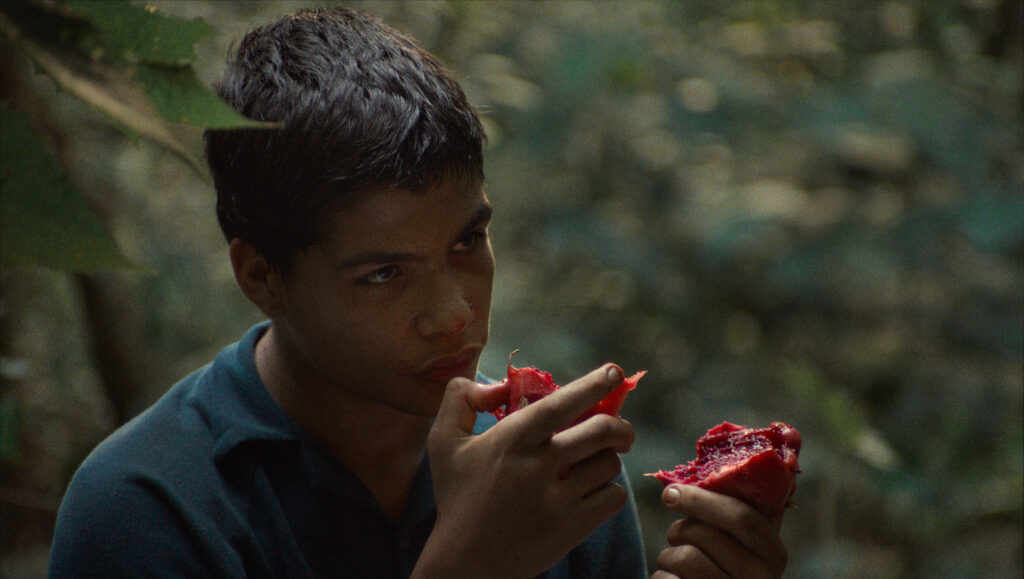La Jauría, the debut film of Colombian director Andrés Ramírez Pulido, is set deep in the jungle at a strange prison camp for boys, a dilapidated retreat that its prisoners are forced to renovate. Camp leader Alvaro gives the boys their work tasks, enforces strange punishments like holding an uncomfortable position for a length of time, and leads them in rehabilitation therapy. That therapy mostly consists of repeating mantras, specifically ones of so-called self-recognition. In sessions, the boys are made to not only identify their usually many crimes and confess, but to go farther and identify themselves with the crime, as if it is an innate part of their identity: “I am a thief, I am a drug addict, I am a murderer.”
Eliu (Jhojan Estiven Jiminez) is a murderer. In the film’s opening, he and his troublemaking friend El Mono (Maicol Andres Jiminez) stand under streetlights, blades in their hands until a motorcycle comes by. They kill the rider in what turns out to be a case of mistaken identity. Eliu claims he mistook the man, a minor crime boss called The Invisible One, for his father whom he had planned to kill instead. Now he’s here, doing useless therapy and cleaning out a dirty pool with a bucket while, on the margins, the gang whose leader he killed is looking for him. When El Mono is transferred to the facility, Eliu is set on edge, seeing his partner-in-crime as a black hole of bad influence. Indeed, El Mono’s presence upsets the balance. He mouths off in a way the others don’t and, one night, he attempts to escape.
There is no escape, though, because in La Jauría the surrounding jungle, and the world at large really, is an extension of the carceral facility. If you run, you will be caught. Recidivism is a given and cycles of violence pass from father to son and brother to brother. Before and after El Mono is caught in the beautifully photographed jungle, the others are punished for it, made to work hours before eating. La Jauría is a gorgeous, hypnotic film, one where memorable images sometimes repeat, imbuing the film with a kind of monotony that remains gripping. And while the film’s messaging might skew toward the simplistic, it’s not necessarily incorrect in its assessments: specifically, in presenting a milieu of inescapable trouble both inside and outside prisons.
When his little brother visits, Eliu sees the violent life that led him astray taking root in his sibling, and he’s helpless to support him. But his brother, like all the other boys in the film, fades into a collective statement. Outside of Eliu, there’s little definition to the boys besides the thematic functions they serve. There’s plenty of texture in the film’s images but little in its writing (which can quickly flatten character for the sake of a point). A version of La Jauría with a cast of more detailed, individualized characters might have had room to display a more dynamic version of who these boys are. As it is, we get only the briefest glimpses of these boys behaving like young people. When they repeat those “I am a murderer” mantras, it’s obvious that the filmmaker is troubled by this flat identification. Ramírez Pulido goes to lengths to illustrate the conditions that made the boys this way, and he does so poetically and effectively. But what he doesn’t provide is an alternative to the mantras. These boys are more than their crimes, but La Jauría often struggles to tell us who they, in fact, are.
Published as part of Cannes Film Festival 2022 — Dispatch 4.


Comments are closed.